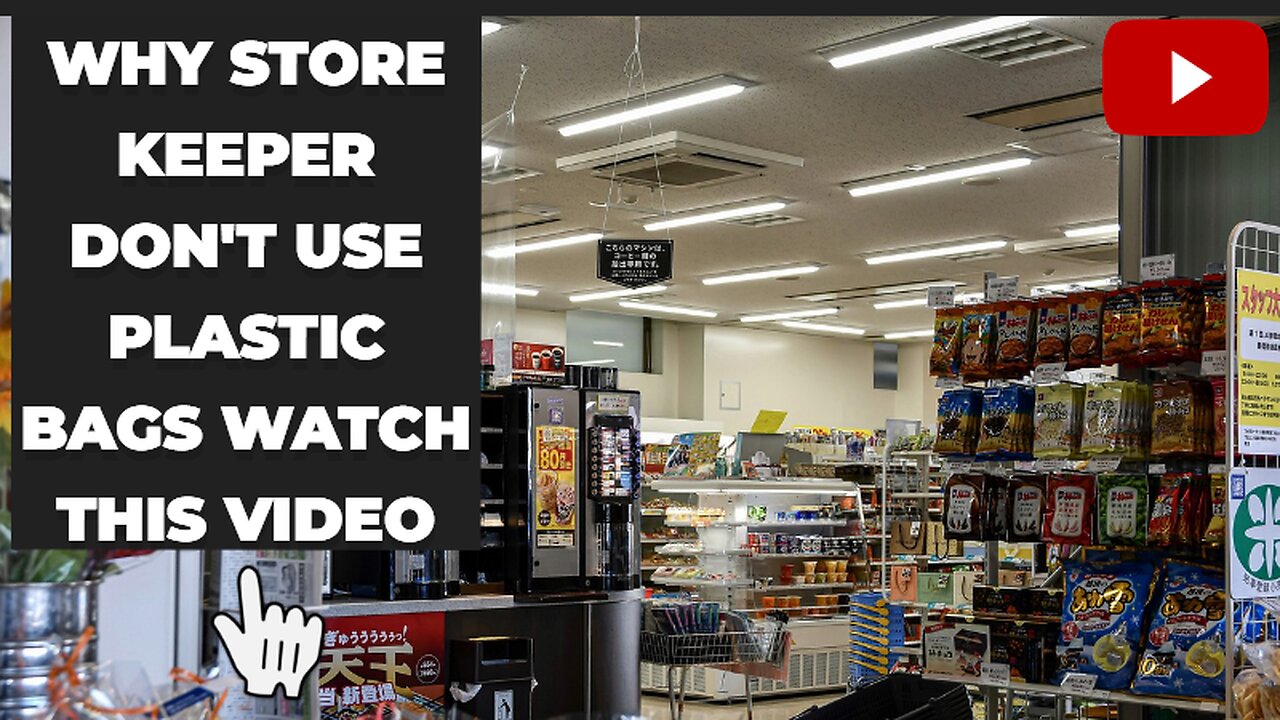Premium Only Content

Why Store Keepers Don't Use Plastic Bags
Plastic bags have several disadvantages, both for the environment and human health. Some of the key disadvantages include:
Environmental Impact: Plastic bags are non-biodegradable, meaning they do not break down easily in the environment. This leads to their accumulation in landfills, water bodies, and natural habitats, causing pollution and negatively affecting ecosystems.
Litter and Aesthetics: Plastic bags are often lightweight and can easily become litter when not disposed of properly. They can be seen littering streets, parks, and oceans, contributing to a decline in the visual appeal of the environment.
Wildlife Hazard: Animals, particularly marine life, can mistake plastic bags for food, which can lead to ingestion and choking. Plastic bags can also entangle wildlife, causing injuries or even death.
Resource Depletion: The production of plastic bags requires significant amounts of natural resources, including fossil fuels (such as oil) and energy. This contributes to the depletion of finite resources and increases carbon emissions.
Microplastic Generation: Over time, plastic bags can break down into smaller fragments called microplastics, which are less than 5mm in size. These microplastics can enter the food chain, affecting both marine and terrestrial ecosystems and potentially harming human health.
Toxicity: Some plastic bags, particularly those made from low-quality plastic, may contain harmful chemicals that can leach into the environment over time. These chemicals can pose risks to both aquatic and terrestrial organisms.
Inefficient Recycling: While some plastic bags can be recycled, the process is often complicated and costly. Many plastic bags end up in mixed waste streams, making recycling difficult and contributing to the overall problem of plastic waste.
Energy Intensive Production: Manufacturing plastic bags requires a significant amount of energy. This contributes to greenhouse gas emissions and climate change.
Economic Costs: Plastic bags can clog stormwater systems, leading to maintenance costs for municipalities. They can also damage machinery at recycling facilities, increasing operational expenses.
Alternatives Available: There are more sustainable alternatives to plastic bags, such as reusable bags made from cloth, jute, or other materials. Using these alternatives can help reduce the demand for single-use plastic bags.
Efforts to address these disadvantages include implementing plastic bag bans or fees, promoting reusable bags, and raising awareness about the environmental impact of plastic bags. It's important to note that the disadvantages of plastic bags vary based on factors such as waste management infrastructure, local regulations, and consumer behavior.
-
 1:02:41
1:02:41
Sarah Westall
8 hours agoDomestic Terror Operation: Death Threats, Smear Campaigns, Gang Stalking w/ Journalist Sarah Fields
48.1K7 -
 1:51:40
1:51:40
Nerdrotic
9 hours ago $14.74 earnedGobekli Tepe Discovery and "Reconstruction" | Forbidden Frontier #118
77.7K9 -
 29:07
29:07
Tactical Advisor
9 hours agoATF Changes Ruling on SBR & Tacpack unboxing | Vault Room Live Stream 039
88.1K16 -
 2:00
2:00
From Zero → Viral with AI
14 hours ago $3.95 earnedAre You Being Left Behind? Why AI Marketing is No Longer Optional
47.1K5 -
 9:10
9:10
BlackDiamondGunsandGear
12 hours agoI Finally Got it! / Rough Country Build Ep.1
32.1K8 -
 9:44
9:44
Millionaire Mentor
3 days agoCharlie Kirk Brings Woke Student To STUTTERING Over White Privilege Lies
34.1K10 -
 24:12
24:12
MudandMunitions
13 hours agoOff-Roading with NYPrepper Wild Elk & PA’s Most Remote Backroads
21.3K1 -
 DVR
DVR
Bannons War Room
7 months agoWarRoom Live
37.4M8.69K -
 3:13:07
3:13:07
IsaiahLCarter
12 hours ago $1.09 earnedAPOSTATE RADIO 029: Leftist Violence, & NYC's Mayor's Race (Guests: Lattina Brown and David Sivella)
18.1K -
 10:03:41
10:03:41
LFA TV
19 hours agoLIVE: CHARLIE KIRK VIGIL SERVICE!
181K66